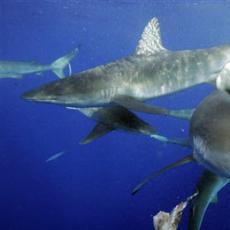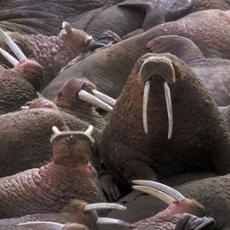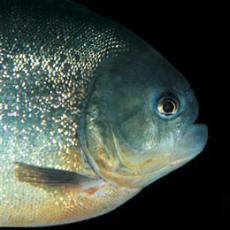
BOB DOUGHTY: This is SCIENCE IN THE NEWS, in VOA Special English. I'm Bob Doughty.
BARBARA KLEIN: And I'm Barbara Klein. Today, we tell about temperature changes on the planet Mars. We also tell about a new law to protect sharks, and how melting ice is a threat towalruses. And we tell about sounds made by fish best known for their killer bite.
(MUSIC)
BOB DOUGHTY: Scientists at the California Institute of Technology have reported evidence that Mars was warmer and wetter long ago than it is today. The Caltech scientists say they have directly established the temperature of Mars four billion years ago. At least, they established the surface temperature on part of the planet at that time. The researchers say it is the first such evidence to be discovered and presented.
The Caltech scientists say carbonate minerals formed on Mars at about 18 degrees Celsius. They reached the finding after studying a meteorite that had its beginnings near the Martian surface.
Today, the average temperature on Mars is 63 degrees below zero Celsius.
BARBARA KLEIN: The finding was reported on the website of the Proceedings of the National Academy of Sciences. Caltech Assistant Professor Woody Fischer helped to prepare the report. He says 18 degrees Celsius is not especially cold or hot. He says this makes the finding extremely interesting. Knowing the temperature can give scientists an idea of the climate on Mars long ago. It can also help them decide whether the planet had liquid water.
Spacecraft orbiting Mars have shown what appear to be rivers, lakebeds and mineral deposits. These images suggest that, at one time, water did flow there. Mars Rover vehicles and other spacecraft have confirmed the information.
BOB DOUGHTY: Caltech Geology Professor John Eiler was another writer of the report. He says knowing the temperature of Mars from long ago provides valuable information. It shows that early in the planet's history, at least part of Mars could support a climate like that of Earth.
The meteorite the scientists examined is one of the oldest known rocks in the world. It is called the Allan Hills meteorite. Its name came from the place in Antarctica where it was found in 1984. The meteorite is believed to have blown loose from the Mars' surface when another space rock struck its "home."
(MUSIC)
BARBARA KLEIN: Earlier this year, we reported on sharks. Wildlife activists worry that some kinds of sharks are in danger of disappearing. We also told how demand for sharkfin soup has led to the killing of millions of sharks. The animals are harvested for meat, liver oil and, especially, for their fins.

Last month, the governor of California, Jerry Brown, signed a bill that bans the sale or possession of shark fins in the state. The California Senate approved the bill in September, by a vote of 25 to nine.
In a statement, Governor Brown said the practice of cutting the fins off of living sharks and throwing them back in the water is not only cruel but harms the health of our oceans.
BOB DOUGHTY: Wildlife activists say 73 million sharks are killed each year, mainly for their fins. Sarah Sikich, of the group Heal the Bay, praised the decision to ban the sale or possession of shark fins in California. She says much of the demand for shark fins comes from the state.
SARAH SIKICH: "California is a leading importer of shark fin to the US It's estimated that 85 percent of the shark fin that enters the US comes through California. Because the fin is driving the market value of the shark, it's most important to target that aspect."

California has the largest Chinese-American population in the United States – an estimated 1.1 million people. Some Chinese-American politicians supported the shark fin ban. But opponents have described the measure as an attack on Chinese culture. State senator Ted Lieu voted against the ban.
TED LIEU: "You can slaughter this highly vulnerable shark for fish and chips but a Chinese restaurant couldn't take a shark fin from one of the hundreds of shark species (that) are nowhere near endangered and to me that is completely discriminatory and very unfair."
The California shark fin ban will become law on January 1st. Existing supplies of shark fins may be sold in the state until July 1st, 2013.
(MUSIC)
BARBARA KLEIN: Thousands of big brown bodies with bright teeth spread across the Alaskan coastline this past summer. Some reports say there were as many as 20,000 of them. No, we are not talking about holiday travelers enjoying a visit to Alaska. These were walruses! And they were looking for a place to rest, as well as something to eat.
BOB DOUGHTY: Falling ice levels in the Arctic Ocean are a threat to Pacific walruses. Earlier this year, American officials considered listing the walruses under the Endangered Species Act. The animals spend as much as two thirds of their time at sea searching for food. When not looking for food, they like to rest on large pieces of floating ice. Female walruses also take to the ice to give birth, and to care for their young.
But low summer ice levels in the Arctic forced Pacific walruses from their homes in the Chukchi Sea. The animals often search for food over the continental shelf of the Chukchi Sea. Low water levels make it easy for them to search the ocean floor. The Sea also has a large amount of ice, where walruses and polar bears can rest. At least, that has been the case in the past. But recent years have seen a great decrease in ice levels.
BARBARA KLEIN: Two months ago, America's National Snow and Ice Data Center released a report about Arctic sea ice. It said ice levels this past summer measured a little more than four and one third million square kilometers. This was the second lowest level since scientists began keeping records in 1979.
Scientists at the University of Bremen in Germany reported even less ice this summer than the NSIDC. Scientists blame rising temperatures for the drop in sea ice levels. They say ocean temperatures are rising around the world.
In recent years, the record low sea ice levels forced walruses to seek food and rest along the northwest coast of Alaska. But scientists fear there may not be enough food so close to the coast.

BOB DOUGHTY: More than 20,000 walruses crowded onto the coastline earlier this year. The overcrowded conditions put younger smaller walruses at risk of being crushed. More than 130 walruses died during similar conditions in 2009.
Some scientists have warned that, if temperatures continue rising, Arctic sea ice may disappear completely by 2030. They say this would threaten walruses and the whole ecosystem in the Arctic Ocean.
(MUSIC)
BARBARA KLEIN: Piranhas are known as dangerous, meat-eating fish. However that did not stop scientists in Belgium from working with them to learn more about the sounds these unusual fish make.
There are more than 20 different species of piranhas in the wild. Two or three of them are a threat to humans. Among them are the red-bellied piranhas. The scientists knew that red-bellied piranhas produce sounds. However it was not clear when or why they make these sounds. So a team of scientists studied red-bellied piranhas to learn more about how they communicate. The head of the team was Eric Parmentier from the University of Liege.
Using underwater microphones, the scientists recorded the sounds the fish made as they swam around and competed for food. They found that the well-fed fish were mostly quiet. But when the piranhas threatened each other over food, they produced a barking sound. It was the same sound they made when the scientists picked them up with their hands.
BOB DOUGHTY: At first the scientists thought the fish made just this one sound. But they learned that the piranhas produce two or more other sounds. When the fish are fighting for food and circling an opponent, they make a short, drum-like sound. When they bite each other, their jaws make a softer, croaking sound.

Piranhas produce noises by vibrating, or moving their swim bladders. These gas-filled organs help them control their position. The scientists studied how the fish used muscles to vibrate their swim bladder, creating the sounds.
The findings were published in the Journal of Experimental Biology. Professor Parmentier and the study's co-author, Sandie Millot of the University of Algarve in Portugal, did not complete their study without falling victim to the aggressive fish. Both scientists suffered bites while holding piranhas.
(MUSIC)
BARBARA KLEIN: This SCIENCE IN THE NEWS was written by Brianna Blake, Christopher Cruise, Jerilyn Watson and June Simms, who also was our producer. I'm Barbara Klein.
BOB DOUGHTY: And I'm Bob Doughty. Join us again next week for more news about science in Special English on the Voice of America.
walrus: 海象
meteorite: 陨星;流星
fin: 鱼翅
piranha: 食人鱼
All about fireflies and possible liquid water on Mars
6 astronauts train for eventual Mars mission
(来源:VOA 编辑:Rosy)
